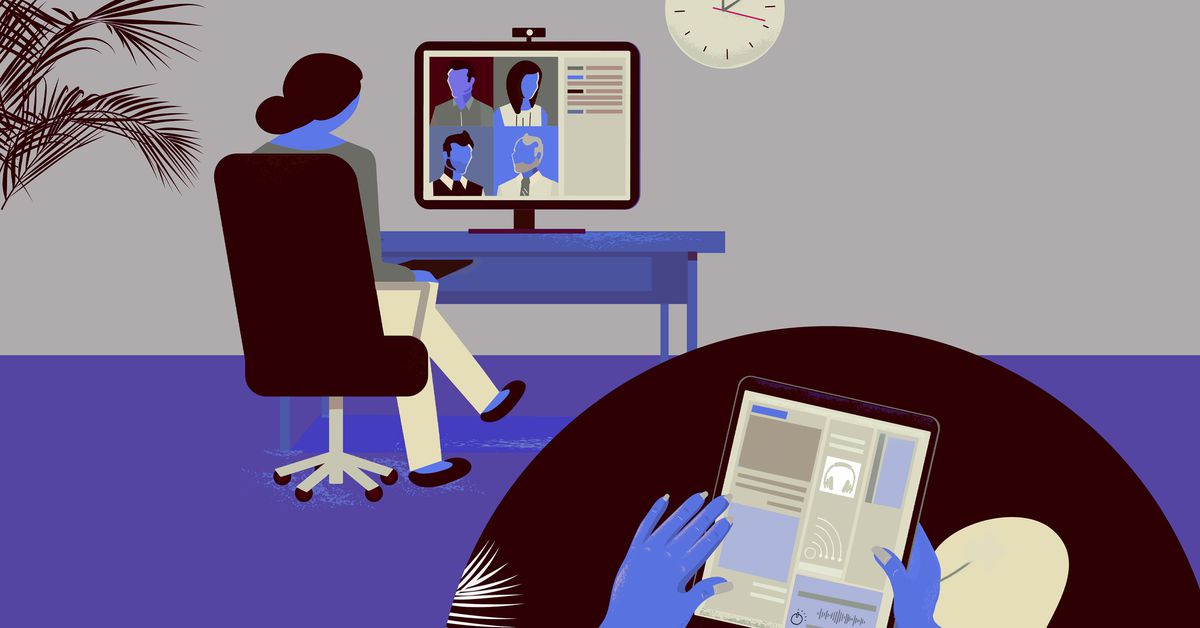Shari Rose is working on her own SEO company while doing SEO full time for someone else.
Her full-time job involves helping dentists in California, but her new business, Blurred Bylines, focuses on small firms and nonprofits in Michigan, where she lives and works remotely. Rose says her main job is still her main priority. She also says her job is aware of her startup and is okay with it.
“They were very explicit in saying that they really needed me, and they really wanted me to stick around,” she said. “I get the impression that they are willing to make a couple of sacrifices.”
Rose is one of an increasing number of remote workers who are using the freedom, flexibility, and time saved by working remotely to start their own businesses, without sacrificing their steady paychecks. These founders say the ability to work on their businesses during lunch breaks and lulls at their jobs has enabled them to pursue something more meaningful than their day job. They’re also motivated by many of the same forces driving the so-called Great Resignation, namely how the pandemic caused people to reassess what’s important in their lives. But instead of quitting or finding another job, this cohort is taking advantage of a tight labor market to pursue new ventures and hold on to their jobs, just in case.
Enter the side startup.
Last year, more Americans than ever started their own businesses, and 2022 is projected to set another record. At the same time, the national unemployment rate is at a 50-year low. According to research shared with Recode, the share of small business and startup founders who work for someone else has ticked up from 38 percent before the pandemic to 42 percent since the pandemic began, according to a survey of microbusinesses by Venture Forward, a research initiative by GoDaddy. Early-stage investor Thomas DelVecchio told Recode that a majority of the funding requests he’s getting these days are from startup founders with full-time jobs, which was rarely the case pre-pandemic. At the same time, venture capital funding is drying up, so founders are less likely to get checks that would relieve them from their day jobs.
The rise in side startups coincides with remote work becoming more mainstream during the pandemic. Even though many offices have opened back up, 30 percent of all American workers have hybrid arrangements that allow them to work from home some of the time, while another 15 percent work from home full time, according to June data from WFH Research. Stanford professor and WFH Research co-founder Nicholas Bloom, who is constantly in conversation with corporations about their future of work plans, estimates levels of remote work to stick around present levels of 45 percent working from home at least some of the time.
Some employers sanction their employees’ startups, or they’re at least willing to look the other way. Others worry that side projects like these could eat into the employee’s productivity or that employees’ extra energy could have gone to their full-time jobs. The situation also brings up thornier questions like who owns a worker’s time and intellectual property. Still, the tight labor market means employers don’t want to lose their highest performers — and ambitious startup founders often fit this description — by being too strict.
At face value, this trend might look like the latest version of side hustles, which have been a thing forever. People have been picking up freelance projects, driving Ubers, or selling crafts on Etsy as a way to make extra cash and nurse their creativity for years. But having a side startup is different because people are creating full-fledged businesses that are meant to supplant their main job. The current trend is also distinct from being over-employed, a situation in which remote workers secretly take on two full-time jobs for someone else. Their goal is two paychecks for one 40-hour work week and to get back at what they think is an unfair system.
Recode recently spoke to 10 founders who are starting startups while working remotely full time to learn how they’re doing it and why. A number of them asked to keep their names, employers, and startups anonymous in order to avoid endangering their jobs.
To many of the people we spoke with, a side startup isn’t just about earning extra cash. It’s about pursuing something they’re passionate about, doing it their own way, and eventually leaving their bosses to become the boss themselves. And while people have always worked nights and weekends to start their own businesses, remote work gives them more time and flexibility to do so and a better hedge against failure.
Remote work makes side startups much more possible
Starting your own business while working full time was certainly possible before the pandemic, but the rise of remote work has made this scenario more attainable for more people. Importantly, remote work provides workers some distance from their managers.
Amanda Northrop/Vox
“It’s logical that people would be exploring ideas that maybe they couldn’t explore when they thought that their boss was standing over their shoulder,” a person working remotely at a startup accelerator told Recode. During the hours formerly spent commuting, getting lunch, and killing time, this year he and a co-founder have also been working on building a sports app. They both have full-time jobs that are their main priority, but if it works out, the accelerator manager would love to work on the startup exclusively.
He, like many of the people we spoke with, believes remote work has given him and his co-founder time and space to do both their day jobs and their side startups — and they believe they’re doing so without sacrificing the quality and quantity of work they’re doing for their employer. Indeed, a number of people said they’ve been promoted while working on both.
Doing both, they reason, can be a win-win situation because the employer gets to keep their hardworking employees while the employees get to work on their dreams without forfeiting economic security.
That outlook makes more sense now than it did a few years ago. If a pandemic in which millions of people have died has done one thing, it’s made people reconsider their lives. Founders have been able to redirect the extra time remote work affords toward their startups, which they often consider to be a passion project.
From nine to five, Kaitlyn Borysiewicz is a communications manager at a nonprofit, which offers her financial security. But otherwise, she spends her time on The Melanin Collective, a diversity, equity, and inclusion consulting firm that aims to help improve the workplace for women and gender-non-conforming people of color.
“This is the work that I love to do,” Borysiewicz said. “The community-building aspect of this work is what I live and breathe for.”
She added that she has approval from her employer and only works on the side startup outside of work hours. In some ways, Borysiewicz sees the situation of working a job and starting a new business as a way for someone in her age group to make up for what they don’t have in other areas of their lives.
“With the confluence of the pandemic, the lack of affordable housing, inflation, global crises, people, particularly people in my generation, millennials, we aren’t guaranteed the same things that our parents had anymore,” Borysiewicz said. “So we kind of demand more of our workplaces.”
That includes wanting equality at work for women and people of color, better health care, and benefits, as well as more latitude from employers for employees to bring their whole selves to work. Women and people of color are more likely to want to work remotely than their white male counterparts because it allows them to do their outsized share of home labor and frees them from many office microaggressions. Now, remote work is enabling them to start their own businesses.
Renegotiating an unfair transaction
For some, working remotely has pointed out huge problems with traditional office work. Many workers, especially those who are able to work well quickly, have had to justify being in an office for 40-plus hours a week, which is not the same as working 40 hours. The physical and psychological distance from the office in remote work arrangements has helped clarify the transactional nature of employment: You’re paid a certain amount to do a certain amount of work, not spend a certain amount of time sitting in an office.
Rather than waiting out the clock pretending to work, side startup founders say they’re using their days more efficiently by working remotely.
A director at a pharmaceutical company said that since working remotely, he’s been able to do better work at his normal job, spend more time with his family, and help secretly found a Web3 consulting company.
“My day starts at 6 am. Technically, if I’ve been on the computer for eight hours, I’m done by 2 pm — and that assumes I have enough work to fill the full eight hours,” he said. “For years, I had to spend hours every day coming up with extra stuff to do, just to keep busy.”
The pharmaceutical director sees the extra time as his to spend. To him, the idea that an employer owns your eight hours is disingenuous. That employer decided what was enough work for an eight-hour day and what that was worth in terms of salary. He added that when he goes above and beyond what’s asked of him and puts in extra hours, that doesn’t come with extra pay.
An unsettling example of the transactional nature of work, the pharmaceutical director explained, came around the birth of each of his three children. Each time, he said that he was in line for a promotion that he was sure he’d get, and his employer used that as a bargaining chip.
“Every time, the first question they ask you is, ‘So I know the kid is coming soon, how much time are you planning to take off?’ I go, ‘I don’t know, a week I guess?’ when my answer should be a month at least, and they go, ‘Great, we’d love to offer you the role.’ You can tell it’s contingent,” he said.
This is one of countless examples of employers squeezing as much labor out of employees as possible, without consideration for their well-being. It’s also why many founders don’t feel bad about taking back some of their time to pursue their side startups.
If it’s going to be a transaction, they figure, it may as well be a fair one.
To tell the boss or not to tell
While some people told us they’ve been open with their employers about their startups, others said they either minimized the extent to which they worked on them or were too afraid to tell their bosses anything.
For those who chose not to tell their employers, it was typically out of a sense of self-preservation rather than feeling like they’re doing something wrong. A marketing director at an e-commerce company who’s been working on an HR company on the side told us he can’t count the number of times he Googled questions like, ‘Should you be honest with your current employer?’ or, ‘How long should you stick with your full-time job until you can go full time with the startup?’
In the end, the marketing director opted not to tell his employer, fearing his employer would wrongfully doubt his focus and productivity. He’s now been working on his startup for two years and even switched full-time jobs earlier this year hoping to have marginally more free time to work on his own company. And because he doesn’t have savings from a giant tech salary or family wealth behind him, he sees continuing to work full-time as the only way to build his business.
“To work on a startup without a steady income is just batshit crazy, honestly,” he said. “The pandemic has shown that you can’t put all your eggs in one basket or rely on your corporate employers to provide for you.”
Many side startup founders were quick to point out that their jobs could fire them at any point, regardless of how loyal they’ve been or how much work they’ve put in.
“I don’t feel bad at all because I give my full-time job eight or nine or sometimes more hours of work a day,” said one software engineer who’s building his own subscription financial metrics and visualization website for retail investors. That’s been especially possible as a global pandemic has curtailed some of his other pastimes like playing sports and poker. “There’s no guilt there.”
Instead, the 46-year-old views his side startup as a “ticket out of the hourly grind” and a way to hedge in an industry he fears will try to outsource his work or give it to someone younger and less expensive.
Other side startup founders expressed a similar sentiment. Developing their own business allows them to be self-sufficient. And if it takes a steady paycheck to get there, so be it.
How the other side feels
Of course, there’s a reason why most of the founders we spoke to have kept their startups secret: Their potential investors and bosses aren’t necessarily going to be as happy about their multitasking as they are.
For some employers, the idea of an employee having a side startup is especially troubling since they already have so many fears about keeping tabs on employees in a remote environment.
A person who works in leadership at a software company said that, since the advent of remote work, he’s seen both an employee and another person in leadership working on their own businesses on the side. He asked to be anonymous because he isn’t authorized to speak for his company and didn’t want to upset his co-workers. When he approached the employee’s manager about why it was taking so long for the normally very talented person to finish a project, he found out the person was also running a clothing company and a popular food Instagram account.
“As a manager, it sucks. As someone who’s a proponent of people being on their career journeys and really discovering who they are and what they want to be, I applaud it,” he said. “But at the same time, I’m like, ‘I’ve got shit to do.’”
Managers fear that the trend writ large could have far-reaching effects on productivity and innovation at companies generally, and that they may have to hire two people to do the same job one used to do.
So why not just fire employees running side startups? Some of these startup founders are also very good at their full-time jobs, even when distracted. Additionally, amid the Great Resignation, it has been harder and harder to fill jobs when people leave. And having to find a replacement or operating with fewer workers is expensive and time-consuming for the company. Many bosses are loath to let these founders go, especially if they’re high performers.
Chinwe Onyeagoro, CEO and founder of PocketSuite, sees working on a startup as a good thing for her employees and for her business. PocketSuite is a business app for solo entrepreneurs and small business owners, many of whom also have their own full-time employment.
“If you think about the Michelangelos of the world, they were not single-function players,” she said. “Somebody who’s a founder and innovator has a lot of ideas and wants to apply themselves in a few different ways. Your best people are going to show up that way.”
As a way of attracting and retaining such people, Onyeagoro is encouraging her own workers to follow their entrepreneurial dreams and hiring people who are already doing so. She doesn’t see it as losing time, especially since the company has gone fully remote and her employees have flexibility on when to work. As long as they’re hitting their deadlines, keeping these people is a no-brainer.
In some ways, this wave of remote entrepreneurs is taking advantage of a singular opportunity. They’re using employment to write employment out of the equation.
As offices reopen and the worst pandemic restrictions subside — and as fears of a recession rise — this window for entrepreneurs will grow smaller, but it’s unlikely to close. Many of the underlying reasons for the tight labor market, like an aging workforce and poor child care infrastructure, aren’t going away.
Remote work also is not going away. Firms are offering remote work as a way to make up for wages that aren’t rising as fast as inflation and are having to continue to do so to stay competitive with their competitors.
So far, there doesn’t appear to be a recession in hiring. Even if there is a recession, that does not necessarily mean companies will revoke remote work. Experts we spoke with thought it was possible a recession could lead to more remote work as companies downsize office leases to save money. More remote work could lead to more employees finding new uses for their extra time. And that might mean happier workers all around.





















Discussion about this post